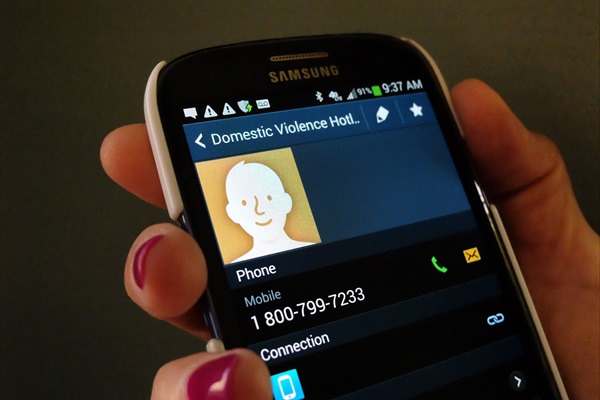What congregations can do
• Include domestic violence protocols in the church’s safe-sanctuary policy and practices. Have accountability for abusers.
• Encourage clergy to address domestic violence from the pulpit.
• Invite representatives of local domestic violence agencies to make educational presentations.
• Address equality, conflict, violence and control in pre-marriage counseling.
• Develop youth programming emphasizing gender equality and nonviolent conflict resolution.
• Provide visible support for victims (bulletin inserts, display tables at wellness fairs and bathroom-stall posters with removable hotline numbers).
• Build education and awareness through ongoing events.
• Make church space available for domestic violence agency use and healing services for survivors and support groups.
Adapted from What Every Congregation Needs to Know about Domestic Violence, FaithTrust Institute, www.faithtrustinstitute.org.
In 2006, Stephanie Greiner met her future husband on Memorial Day weekend and married him after a six-week courtship. Friends and family all asked the same question: “Are you crazy?”
A year later, their first son, Elliot, was born; his brother, Oliver, arrived 13 months later.
“These two little babies were blessings, joys, stresses, challenges and everything else a new family deals with,” Greiner recalls. Recovering from Oliver’s birth, however, she began to realize, “Something is not right in my marriage.”
She found reasons to excuse her husband’s angry, violent behavior. But one day, he directed it toward Elliot – throwing a sandal at the 3-year-old, knocking him off his feet and leaving a large bruise.
“Two months later,” she says, “I was sitting in a room with my United Methodist Women sisters from across the nation, discussing domestic violence and realizing, ‘These women are talking about me.’”
Knowing she had to do something about her situation, Stephanie moved with her sons into her parents’ home.
“During this process,” she remembers, “we had many church family members reach out, but it was the two very different responses from my United Methodist pastors that helped me realize that domestic violence is something we just don’t ‘deal with’ well in the church.”
The pastor of the church she attended with her husband and children, Greiner says, “could not wrap her brain around the fact that he would do that. She specifically said, ‘I know you two have had problems, but it’s nothing we can’t work through. He’s really hurting.’
“The pastor at my parents’ United Methodist church had a completely different approach. He not only showed empathy and concern for my children and me, but also for the new role that my parents were playing in our lives. He was always open to listen, pray and provide spiritual guidance as I was living through a messy divorce and child custody battle.”
Blessings abound
She counts her blessings.
In December 2013, another member left $1,500 cash on her desk at the church where she was working part time to help pay the costs of the custody battle.
Greiner says, “No one was aware of the phone call I had received that day from my attorney telling me I owed our court-appointed psychologist $1,500 before she would release her findings to the court. Six hours after that phone call, I walked into Wednesday night services and there it was, with my name on it. It was truly God taking care of me through my United Methodist church family.”
Mollie Vickery stresses the importance of congregations reaching out with love and compassion. She is executive secretary for children, youth and family advocacy for United Methodist Women.
“We know that statistically our pews and pulpits are filled will survivors, abusers and sadly, some who won't survive,” she says. “We also know that pastors do not talk about this nearly enough, if at all, and when they do, they may be ill-equipped for the flood of people who may come forward for help and support.” Awareness, training and building relationships with local domestic violence agencies are essential in addressing domestic violence as a faith community.”
United Methodist Women works in partnership with United Methodist Men and FaithTrust Institute to offer conferencewide church-team trainings and national train-the-trainer events.
Community needed
Sharon Hachtman, a registered nurse and United Methodist deaconess, served at a shelter for abused women. She often asked women to consider resources such as personal strengths, abilities and friends in order to build their sense of empowerment.
As the women of different belief systems shared their own faith practices, she explains, “It became apparent to me that they were describing solitary, one-on-one experiences such as reading Scripture, prayer and listening to spiritual music.
“What was sadly lacking was any conversation about spiritual strength found within faith communities.”
Systemic change must happen “so that victims who risk reaching out are met by faith communities that have developed systems of informed response,” she notes. The focus, Hachtman says, must be on safety for survivors and their children and accountability for abusers.
She tells congregations and their leaders:
• Do not violate victims’ trust by breaking confidentiality or giving advice that might lead them into greater harm (such as suggesting marriage counseling).
• Affirm them: “I believe you.”
• Voice concern: “Let’s talk about your safety.”
• Offer contact information for community domestic violence agencies. Have them memorize the national hotline number, 1-800-799-SAFE. It may be unsafe for them to carry contact information.
• Provide a safe, private location at a church from which to make a telephone call.
“None of us as helpers should ever put a battered woman in the position of having to choose between her safety and the support of her religious community,” says the Rev. Marie Fortune, founder of the FaithTrust Institute, in Domestic Violence: A Faithful Response (United Methodist Women). “She needs both, and it’s up to us to provide that.”
Barbara Dunlap-Berg, associate editor, Interpreter, and general church content editor, United Methodist Communications, Nashville, Tennessee
RELATED LINKS
Domestic violence awareness - United Methodist Women
Protect all women -- General Board of Church and Society

